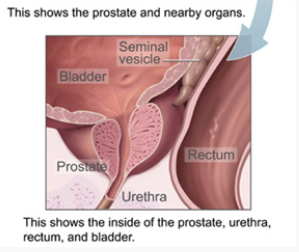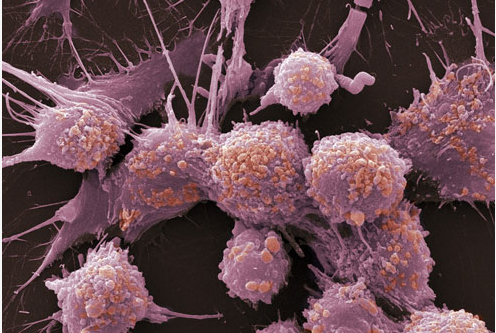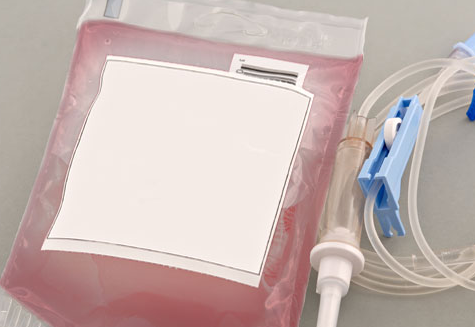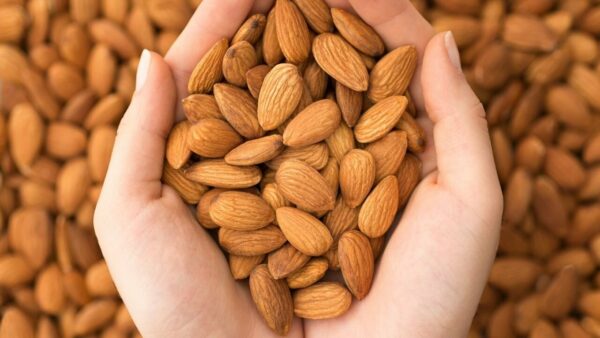The word prostate got taken from the Greek language meaning ‘one who stands before or one who guards or one who protects. It is a compound exocrine gland of the male reproduction system being a walnut-sized gland just below the bladder at its mouth.
It produces a part of the white alkaline liquid ejected by the male. Its shape varies anatomically, chemically and physiologically amongst the mammals. It ranks second most common cancer after the skin cancer in men. Prostate cancer grows slowly but sometimes it can be offensive and grow rapidly without medication.
 Photo courtesy: Wikipedia
Photo courtesy: Wikipedia
Symptoms of the Prostate Cancer: There are no early signs. The following indication may include:
1. Numerous urination during the nights.
2. No control over commencing and ending the urination
3. Inadequate or broken flow of the urine.
4. Blood in the urine or the semen.
5. Aching or profound sensation while passing the urine.
6. In last stages of cancer pain in the lower back, upper thigh or hips.
Expanded Prostate or Prostate disease:
As men age, the prostate grows larger, pressing on the bladder and produce almost as prostate cancer or BPH benign prostatic hyperplasia. It is not cancer and treatable if the symptoms get troublesome. Urinary symptoms may also occur.
Non-Controllable risk circumstances. After the age of 50, the prostate may be apparent. After age 0f 70 most men have some prostate cancer without any outward symptoms. The men of African-American descent have the maximum percentage of the disease. Those having the family history of especially the brother or the father with the disease have the highest liability.
Controllable risk circumstances:
Animal fat intake increases the prostate size, and alternately the low consumption of vegetables and fruits produce the lower growth. The reason is believed to be that cancerous cells grow more with meat diets just mentioned. Therefore, it is safer to switch over to the vegetarian diet and give up meat, fatty foods.
More about Prostate Cancer:
In the US, there are no Government guidelines to conduct the routine test for the Prostate (BPH – benign prostatic hyperplasia) at any particular age. It is well known that usually the results show that cancer of the prostate is extremely slow. And the medical treatment gives no benefit. On the contrary, the medications have serious side effects. The myth prevailing in the world about prostate cancer that having much sex, masturbation, a vasectomy or BPH or enlarged prostate you are at no risk of prostate cancer. Many tests and researches are on to find out what conditions produce enhanced prostate cancer.
– It would be easy to learn that 1st treatment of beam radiation from outside can kill the cancer cells that would also control the bone pain spreading around. The brachytherapy by which rice grain sized radioactive pieces gets inserted into the prostate. The side effect of erectile dysfunction, stress or urination problems may result.
– With the introduction of radical prostatectomy, cancer gets eradicated and controlled when the cancer is limited to the prostate. If the lymph nodes get cancerous, this method is avoided, and the only answer is surgery. The defect of urination and sexual function get delayed and better after some time.
– Many times only hormones injection tried, which may decrease cancer spreading, but it has to be used along with some other drug to eradicate the disease. It is noted that use of medications and hormones may have any of the side effects of hot flashes, breast tissue growth, stop the male hormones called androgens and testosterone leading to impotence.
DRE and PSA Screening
A digital rectal exam (DRE) is done to decide if the prostate is expanded and is either soft or has bumps or is very firm (hard prostate). Another test done on a blood sample can determine the level of a protein (prostate-specific antigen or PSA) produced by prostate cells. The PSA test may indicate a person has a higher chance of having prostate cancer but controversies about the test exist (see the following slide).Via
The patient and his doctor need to carefully consider the meaning and the use of these test results.
Treatment: Treatment is intravenous lasting between 3 to 6 months. The chemotherapy kills fast, the other growth cells and cancer cells through the human body and in the prostate as well at the same time. Since it is aggressive dose treatment, the cancers cells and healthy bodybuilding growth cells are also decimated throughout the body. It results in loss of hair and patient invariably gets bald.
– The other system of cryotherapy has used the freezing of cells theory. The experience shows that freezing kills the cancer cells and also damage nerves. Right after cryosurgery about 80% of men become the impotent and have short time pain. There may be throbbing feeling prevails in this method in the bladder and bowel.

Photo Courtesy: WebMD
Treatment with Prostate Cancer Vaccine: In the advanced prostate cancer state a vaccine is given to treat and to encourage the immune system to kill the cancer cells. The immune cells are withdrawn from the blood and reinjected after activating them. Three cycles get used within a period of one month. The vaccine treatment gets preference when the hormone treatment fails for the treatment of the prostate cancer. The side effects may be anything between weakness, vomiting and temperatures.

Photo Courtesy: WebMD
Posible treatment for Cancer that is not controlled.
It depends on the consultant treating a patient who would regularly observe the PSA level and have additional tests carried out and give other therapy. It may get noted that those who adopt an active physical routine has the lower chance of succumbing to death.
Living with Erectile dysfunction (ED).
The usual side effect of having erection problem last for about two months and would improve slowly through medication. Alternative doses of injection therapy and vacuum devices may help.
Diet for Prostate patients: The prostate cancer is likely to get prevented by having foods with high folate value, thus mustard green, radish juice and pulses. Awareness of having the diet to counter the disease.
1. Take, at least, five vegetables and fruits daily.
2. No more of excessive fat or greasy food
3. No more of red meats and especially no processed meats
4. Take coarse and whole grain and stop intake of white rice or fine flour.
5 Say goodbye to alcoholic beverages
6. It is best not to take any supplements promised in the market to treat the prostate or Selenium, and Vitamin E is not helpful for said cancer.
In any case, do tell your doctor about any supplements taken by you.

Photo Courtesy: WebMD







